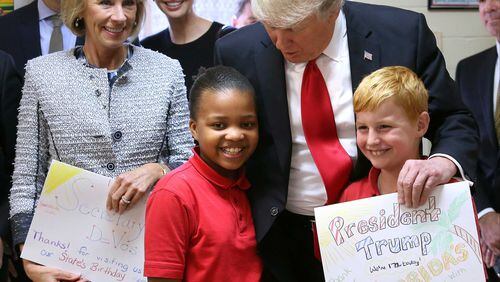A month into the job, U.S. Secretary of Education Betsy DeVos continues to push the school choice agenda to which she has long devoted her time and fortune.
Last week, she attempted to portray Historically Black Colleges and Universities as examples of school choice rather than of segregation and racism.
In her latest laudation of choice, DeVos extols the virtues of Catholic education, issuing this statement Friday after visiting St. Andrew Catholic School in Orlando, Fla., with President Donald Trump, his daughter and son-in-law.
I am proud to join President Trump in his efforts to empower all of America's school children – including students from low-income families who are often trapped in underperforming schools – with educational opportunity. We have an obligation to put parents in charge and provide every child with the chance to reach their full potential.
Regardless of the type of school, we must support great schools, great teachers and offer every child an equal opportunity to a great education.
I attended 12 years of Catholic school. Many parochial schools do a fine job, and parents have every right to send their kids to one if they choose. But taxpayers should not fund their choice.
Voucher proponents argue local dollars should follow the child because "it's the parent's money." It's not. It's the community's money.
On average, it takes $9,202 a year to educate a child in Georgia, according to the latest Census data. Some districts spend $12,000. That means households with two children would have to pay $24,000 in school property taxes to cover their children's education. Few homeowners in Georgia pay that amount in school taxes. The expense is borne by the community as a whole, no just parents. The community pools its money to support public education.
There is little evidence that vouchers could replace public education. (There's also little evidence vouchers outperform public schools.)
A new analysis from the Center for American Progress finds vouchers unlikely to work in 85 percent of the more than 13,000 school districts in the United States.
The study cautions:
There is also no reason to believe the new schools that crop up in response to the voucher initiative would be higher performing than the schools that are in operation today. Once researchers account for demographics, students in public schools actually outperform students in private schools, according to a large-scale 2014 study of National Assessment of Educational Progress, or NAEP, data. And like most public schools in rural areas, these private schools would face significant challenges recruiting and retaining qualified teachers, providing differentiated and challenging content, providing support for students with special needs, and more. And if these new schools are competing with the existing public schools, they will dilute the resources available for each. The likely result would be a race to the bottom, with two sets of schools struggling to provide a high-quality education to children who badly need it.
Here is how CAP analyzed the applicability of vouchers in American school districts:
CAP's analysis lays out the potential impact that the Trump-DeVos voucher plan would have on these three types of districts. In all cases, a voucher program—which, as CAP's analysis shows, is already unworkable in the vast majority of districts—would draw valuable and scarce resources away from existing schools, leaving public schools without the necessary resources to support teachers, classrooms, and building maintenance. CAP's column also shows how public-school choice—as opposed to private-school voucher programs—has proven feasible and effective in many urban districts across the United States, as Stanford University's Center for Research on Education Outcomes has shown.
Nearly half of Georgia's school districts qualify as "sparse," which means they are unlikely to benefit from vouchers. There just aren't enough kids to create a market for school choice. That's why most of Georgia's startup charter schools choose to open in metro Atlanta where they can count on two critical elements -- enough students and higher per-pupil spending.
And that's who universal vouchers would help -- students in areas where there are already strong private school options and where parents can pay the percentage of tuition that would not be met by the voucher.







